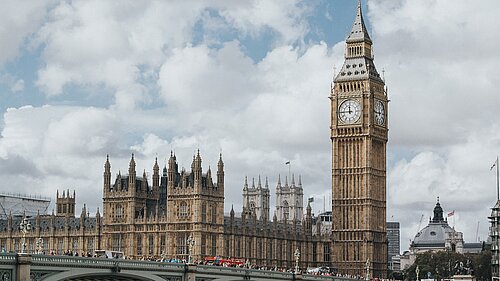Westminster Hall PIP Debate

Today saw a Westminster Hall debate on Personal Independence Payment and disabled people and the government's proposed PIP cuts.
Several Liberal Democrat MP's contributed. Here is what they had to say:
Clive Jones (Wokingham) was the first Lib Dem to speak in the debate and said: "Young people battling cancer are being failed by the system. They are forced to wait an average of eight long months before they can access PIP, including a three-month qualifying period that applies even after a confirmed cancer diagnosis. In that time, those young patients and their families face an extra £5,000 in out-of-pocket costs, on top of the emotional, physical and psychological burden of the cancer itself.
“Does the Minister understand the consequences of these reforms for young people already enduring the fight of their young lives? Will he commit to working with his ministerial colleagues to scrap the arbitrary wait times, ensure that a medical diagnosis alone is accepted as sufficient evidence for PIP eligibility, and reshape the system so that it does not punish but protects?”
Edward Morella (West Dorset) said: "Too many disabled people in West Dorset are living in fear: fear that the PIP support they rely on will be taken away or that loved ones might not qualify. In recent weeks, I have heard from 190 constituents each sharing their distress about the plans. One of my constituents, Barbara, is 65. She has lived with juvenile idiopathic arthritis since she was three. She has experienced constant pain, multiple surgeries and increased disability throughout her life. Yet she worked in social services for many years and never claimed employment and support allowance. Her PIP award helps her fund the support she needs to give her independence: mobility equipment, home adjustments and private care when the NHS service falls short.
"Despite scoring three points in some areas on her most recent assessment, and scoring on virtually all areas of daily living, Barbara would not qualify for any support under the proposed changes. For constituents such as Barbara, this is a terrifying prospect. As she put it herself:
"“PIP is not a benefit. It is a tool for survival.”
“As we debate the potential changes to PIP, I hope we will remember her words. Disabled people and their carers deserve dignity. They deserve to be seen not as a cost to be managed, but as valued citizens, worthy of respect and entitled to fairness and compassion from this House.”
Jess Brown-Fuller, Lib Dem MP for Chichester: "With limited time, I will share the voices of some of the 200 constituents who have been in touch with me about the proposed changes to personal independence payments. For example, one worried father, Robert, contacted me on behalf of his son, Richard, who lives with functional neurological disorder. Robert told me how vital PIP is to Richard, who will never be able to work again. They feel completely abandoned by these proposed cuts and, after countless attempts to engage with the Department for Work and Pensions, they feel ignored and disillusioned.
"Another example is James, who lives with multiple mental health conditions that have left him hospitalised several times in the past. He wrote to me saying:
"“Nearly all my PIP goes towards paying for my guardian angel carer. Without that support, I would have to move into a supported living arrangement, which would make my mental health problems much worse and I would end up in hospital again. I don’t want to lose my independence as I am just managing with the support I have now.”
"For James, it is clear that PIP is the difference between managing or entering crisis.
"Meanwhile, Susan is the sole carer and appointee for several disabled members of her family. Under these proposals, at least two of them would lose all of the support they get. She wrote to me saying:
"“I honestly am broken, life is hopeless—I can’t feed my family if these cuts go through. Please can you join us in fighting the cuts.”
"My constituents in Chichester are not asking for special treatment. They are just asking to live with dignity, fairness and, importantly, independence, which is what PIP gives them. The changes are the exact opposite of what the Government claim they want to achieve."
MP for Wells and Mendip Hills Tessa Munt said, "In response to all the letters and emails from my constituents, I will focus on PIP and the effect that the changes will have on the 1.3 million people who are suffering from ME and long covid. I am particularly concerned that the additional criterion for a PIP award of needing four points in one descriptor disproportionately affects people with ME and long covid, because they currently reach their eight points with a spread of low points across many descriptors.
"The abolition of the work capability assessment and the focus on PIP are a double whammy, particularly given the extra difficulty that people with ME and long covid will have in accessing PIP. They did better under the work capability assessment, because that could accommodate the fluctuating nature of ME and the reality of post-exertional malaise as a distinct aspect of it. PIP does not accommodate the nature of that disability for those who suffer with the condition.
“The Green Paper talks about two positive moves, which I potentially support: the redesign of the PIP assessment and the recognition that many people have lifelong disability and cannot return to work, so there should be some accommodation for them through special funding. I ask that the Minister consider people with ME and long covid when looking at that redesign.”
Lib Dem MP for Yeovil Adam Dance said: "In Yeovil, 7.9% of working-age adults claim PIP, which is higher than the average for the south-west. For my constituents, PIP is not some kind of luxury; it allows them to live their lives, manage their disabilities, go to work and do daily tasks that people without disabilities can do. For example, one constituent told me that
"“we are terrified of becoming homeless if these cuts go ahead”.
"The Government’s proposals are likely to result in rising child poverty, and that is just not good enough. Many of the changes detailed in the Government’s new Green Paper seem to be financially driven. That is simply wrong; Labour should do something about that.
"The assessment process has to change, especially assessments over the phone, which have left my constituents unable to express their needs and get the support they are owed. The Government cannot make decisions about disabled people without consulting them. Over the past decade, we have seen under-investment in our social care system, which has to change. If it does not, there will be no meaningful drop in the welfare bill.
“In conclusion, it is right that we bring down the welfare bill, make Britain healthier and give all our constituents meaningful work, but that cannot come at the expense of the most vulnerable.”
Our Torbay MP, Steve Darling, said: "This is about dignity and independence. What is the point of being an MP? It is to give people agency over their own lives, and that is what PIP does in shedloads—it gives people with disabilities agency over their own lives. In my constituency of Torbay, 8,592 people claim PIP—12% of our working-age population, against a national average of 8%. I have the honour of representing the most deprived Liberal Democrat constituency in the country, and I live some of that myself, being disabled. We face real challenges. The issue is the highest area of interest for those who come to our citizens advice bureau in Torbay.
“Only this week, I met a couple of people who came to take part in events. A blind gentleman from Portsmouth shared with me how he has PIP to back him up if things go wrong with Access to Work—and sadly, things regularly go wrong with the Access to Work system, as the Minister knows, because I have crossed swords with him on this before. I also met a young lady yesterday who has mental health challenges. She is able to have therapy, but that would not be there and she would be spiralling in a mental health doom loop if she did not have PIP to support her.”
Manuela Perteghella, Liberal Democrat MP for Stratford-on-Avon, intervened: “I have heard from constituents who fear that the welfare reforms could actually undermine their ability to remain in employment. Does my hon. Friend agree that many of our constituents rely on PIP as a crucial support that allows them to overcome the barriers they face to staying in work?”
Steve Darling continued: "That is the crucial thing—PIP is there to support people getting back into work; my hon. Friend is quite right.
"Whether it is the Secretary of State for Work and Pensions, the Chancellor or the Prime Minister, they all say that the benefits system is broken, so let us make sure we reform it with some compassion. Liberal Democrats would like to see the benefits system reformed, but we want that to be done with people with disabilities, rather than it being foisted upon them. The Office for Budget Responsibility has said there is no evidence that the cuts will get people back into employment—actually, 300,000 people will end up in poverty. We must also remember that PIP is a passport to other benefits; for example, carer’s allowance is often married to it. Under the proposals, a number of households across the country could lose £12,000 if they lost PIP and carer’s allowance at the same time. That would be massive.
"I want to touch on a couple of case studies. One is from Scope: the case of a gentleman called Anthony who suffers from post-traumatic stress disorder and autism. He gets 13 points—brilliant—but sadly, all those points are collected up under the four-point threshold. That is extremely concerning. He is worried sick about what he will be able to afford, and he works part time. The citizens advice bureau in Torbay reached out to me about a lady whose condition got worse. She was assessed, but sadly she lost her PIP. She is almost a harbinger of what could go wrong for other people, because she is now not able to meet her living costs, particularly her housing costs. That is a massive challenge for her.
"I have a few questions for the Minister. I am particularly interested to know why the Government are introducing this cruel cut to PIP without undertaking reform in advance. As a few Members have highlighted, academics have found that there were about 600 suicides at the time of the change from DLA to PIP. As this cohort is much larger, has the Minister undertaken an assessment of how many suicides there will be? Is it over 1,000? Will he share with us what mitigating measures the Government are considering to ensure we do not hit those figures, which are extremely scary?
“As the Mother of the House highlighted, there was a by-election in the not-too-distant past. Will the Minister listen to the people who spoke in that by-election and make sure that some of the most deprived communities do not have the heart ripped out of them by cuts to PIP?”






